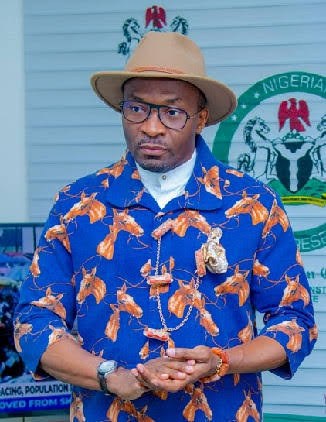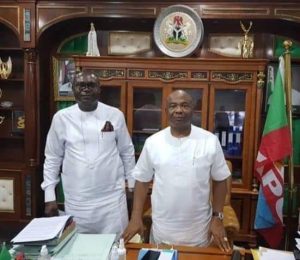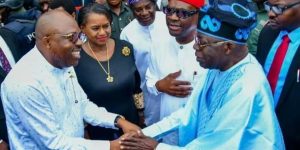South Easterners Are Beginning to Buy Into the Renewed Hope Agenda of President Tinubu — Deputy Speaker Benjamin Kalu
In a compelling interview aired on Arise News, the Deputy Speaker of Nigeria’s House of Representatives, Rt. Hon. Benjamin Kalu, offered a nuanced assessment of shifting political sentiments in the South East region of Nigeria. Speaking live from his native Abia State, Kalu noted that the much-discussed “Renewed Hope Agenda” of President Bola Ahmed Tinubu is beginning to resonate with Southeasterners, a region historically skeptical of the central government.
Kalu’s commentary, rich with both anecdotal evidence and policy analysis, comes at a time when national unity and trust in governance are more critical than ever. He argued that a gradual but notable change in public perception is taking place, fueled by the tangible steps the Tinubu administration has taken to address long-standing concerns and regional disparities.
“I tell you that Southeasterners are beginning to buy into the message of Renewed Hope,” said Kalu. “This is a new dawn for our people. For decades, we’ve looked at the federal government from a distance, but today, that gap is narrowing.”
For years, the South East has often found itself politically isolated, grappling with federal policies that many felt ignored or marginalized the region’s needs. From infrastructure deficits to perceptions of underrepresentation in national appointments, the grievances have been long and deeply rooted.
Kalu acknowledged this historical sentiment but was quick to note the contrast brought about under President Tinubu’s administration. “We have not forgotten the past,” he said, “but what is important is what we do with the present to shape the future. And President Tinubu has shown that he’s committed to an inclusive Nigeria.”
YOU MAY READ
House of Representatives Advances Proposals for Four New Nigerian States
Perhaps the most potent symbol of the federal government’s renewed engagement with the South East is the successful passage and presidential assent to the Southeast Development Commission Bill. For years, this legislation was caught in bureaucratic and political inertia, unable to cross the finish line despite its critical importance to the region.
“President Tinubu signed the Southeast Development Commission Bill within his first 100 days in office,” Kalu emphasized. “And not only did he sign it, but he also released funds and inaugurated the board. That kind of responsiveness is what our people have yearned for.”
The bill aims to facilitate infrastructure development, economic growth, and social inclusion in the five Southeastern states. It represents a significant policy shift from symbolic inclusion to practical intervention.
Complementing legislative progress is the grassroots mobilization effort led by Kalu known as the “Renewed Hope Partners” initiative. This program, which debuted in Abia State, is designed to connect everyday citizens with the policy direction of the federal government.
The inaugural event was a resounding success, drawing over 30,000 participants—triple the expected turnout. Community leaders, civil society groups, and young professionals turned out en masse, signaling a growing interest in federal policy from a demographic often seen as disengaged.
“The energy was electric,” Kalu remarked. “People are beginning to feel like stakeholders in Nigeria again. They’re asking questions, they want to know how government policy affects their businesses, their families, their communities.”
The creation of the Southeast Development Commission is particularly significant given the region’s history of economic and infrastructural neglect. Modeled after similar initiatives in other regions, the Commission will focus on rebuilding roads, improving healthcare access, enhancing education, and supporting SMEs.
Kalu noted that the Commission is also expected to attract both local and foreign investment, especially in tech and agro-processing. “This is not charity; it’s a strategic investment in a region that has always punched above its weight when given the tools.”
While Kalu’s remarks were region-specific, they also tie into a broader narrative of national cohesion and the fight against cynicism. The Deputy Speaker lauded Tinubu’s political will in implementing tough but necessary reforms, including the removal of fuel subsidy and currency harmonization, even as he acknowledged the temporary hardships they have caused.
“Reform is never easy, especially in a country as complex as Nigeria. But it is necessary. President Tinubu is not just thinking about 2027; he’s thinking about the Nigeria of 2050. That’s leadership.”
Kalu also called for unity across party lines and ethnic divisions. “This is not the time to be Igbo, Hausa, or Yoruba first. It’s time to be Nigerian first. Only then can we build a country that works for everyone.”
Looking ahead, Kalu disclosed that the Renewed Hope Partners initiative would expand to other Southeastern states, and eventually nationwide. Plans are also in place for quarterly town halls and policy forums that will bring federal lawmakers closer to the grassroots.
“Democracy thrives when there is dialogue. We must demystify governance. People should not need a godfather to have their voices heard.”
In a political landscape often marred by distrust and division, Kalu’s insights offer a refreshing perspective rooted in evidence, engagement, and optimism. If indeed Southeasterners are buying into Tinubu’s Renewed Hope agenda, it may signal a transformative shift in Nigerian politics—one that could finally close the gap between the center and the Southeast.
“We are not there yet,” Kalu concluded. “But we are certainly not where we used to be. With continued engagement, sincerity, and tangible results, the future looks promising.”
As the Renewed Hope narrative continues to unfold, the South East may not just be buying into the vision—they could very well be shaping it.
I tell you that South Easterners are Beginning to Buy into the Message of Renewed Hope for president Tinubu—Benjamin KaluSpeaking during an interview on Arise News, Deputy Speaker of the House of Representatives, Rt. Hon. Benjamin Kalu, painted a picture of a people gradually leaning toward belief in a federal government they once viewed from the periphery.Kalu, who spoke live from Abia State, used the platform to highlight how President Bola Ahmed Tinubu’s Renewed Hope Agenda is being received in the Southeast. From economic policy wins to legislative breakthroughs, Kalu argued that the Tinubu administration is addressing long-standing concerns of the region in a way that previous governments, military and democratic alike failed to do.According to Kalu, that narrative is beginning to change under President Tinubu. He cited as a landmark the signing of the Southeast Development Commission Bill, a proposal that had failed to gain traction for years. Tinubu not only assented to the bill without precondition but went on to constitute the board and release funds for its operation within his first 100 days in office.Last week, Kalu convened the Renewed Hope Partners initiative, a grassroots mobilization aimed at demystifying government policy for ordinary citizens. Beginning in Abia state but designed to scale nationwide, the movement attracted over 30,000 people at its debut event, three times the expected crowd.At the inauguration of the initiative, He asserted that;“I tell you that Southeasterners are beginning to buy the message of the Renewed Hope,” finally delivering the statement that ties together policy wins, grassroots mobilization, and historical redemption”





